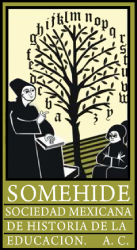Everyday school history: An intermediate analytical category to understand the practices of teaching History in primary school
DOI:
https://doi.org/10.29351/amhe.v4i1.673Keywords:
Specific didactics, basic education, teaching historyAbstract
When referring to instruction in History classes, we often think of rote teaching of important dates, battles and characters, or of the dictation, copying and passive memorization of texts. One source for these assertions has been the history syllabi or materials for grade schools. The purpose of this research is to study and understand the actual teaching of history as a historically situated cultural practice from an ethnographic perspective. To this purpose, History classes given by three fifth grade public primary teachers in Mexico City were observed. Analysis was based on the classes in which they taught the topic of “The Mexican Revolution”. Data was collected through direct observation, fieldnotes, the audio recording of the classes and the personal communication that was established with the teachers. The theoretical-conceptual tools used for data analysis were the three dimensions of reading suggested by Chartier (2005): text analysis; the forms and devices of presentation of texts, and the diverse cultural practices of their use; as well as the three planes proposed by Rockwell (2000) for the study of school cultures: Longue durée, relative continuity and co-construction. The results show that in the approaches of the teachers observed there is evidence of diverse pedagogical practices and knowledge from both past and present sources that they combine to respond to the children’s participation and to actual working conditions including the available time. Thus they configure cultural tools and heterogeneous teaching practices which account for the tension and distance that exists between the instructional model of ‘school history’ assumed or proposed in many official documents and the practice of teaching everyday school history.
References
AEFCM [Autoridad Educativa Federal de la Ciudad de México]. (2019). Guía operativa para la organización y funcionamiento de los servicios de educación inicial, básica, especial y para adultos de escuelas públicas en la Ciudad de México 2018-2019. https://www2.aefcm.gob.mx/normateca/disposiciones_normativas/DGPPEE/Guia-Operativa-para-Escuelas-Publicas-2018-2019.pdf
Barrón, C. (1960a) Historia y civismo. En SEP, Mi libro y mi cuaderno de trabajo de cuarto año. Instructivo para el maestro. Comisión Nacional de los Libros de Texto Gratuitos (Conaliteg).
Barrón, C. (1960b). Mi libro de cuarto año. Historia y civismo. Conaliteg. https://historico.conaliteg.gob.mx/H1960P4HI017.htm?#page/1
Barrón, C. (1960c). Historia y civismo. En Mi cuaderno de trabajo de cuarto año. Conaliteg. https://historico.conaliteg.gob.mx/H1960P4ES014.htm#page/1
Chartier, R. (2005). El mundo como representación. Estudios sobre historia cultural. Gedisa.
De Certeau, M. (2010). La invención de lo cotidiano. 1. Artes de hacer. Universidad Iberoamericana/Instituto Tecnológico y de Estudios Superiores de Occidente.
Heller, A. (1977). Sociología de la vida cotidiana. Península.
Mercado, R. (2002). Los saberes docentes como construcción social. La enseñanza centrada en los niños. FCE.
Monroy, S. (1953). Historia de México. Monroy Padilla.
Plá, S. (2011). ¿Sabemos historia en educación básica? Una mirada a los resultados de ENLACE 2010. Perfiles Educativos, 33(134), 138-154. http://www.scielo.org.mx/scielo.php?script=sci_arttext&pid=S0185-26982011000400009&lng=es&tlng=es
Rockwell, E. (2000). Tres planos para el estudio de las culturas escolares. En N. Arata, J. C. Escalante y A. Padawer (comps.), Vivir entre escuelas. Relatos y presencias (pp. 173-187). Consejo Latinoamericano de Ciencias Sociales.
Rockwell, E. (2001). La lectura como práctica cultural: conceptos para el estudio de los libros escolares. Educación e Investigación, 27(1), 11-26.
Rockwell, E. (2009). La experiencia etnográfica. Historia y cultura en los procesos educativos. Paidós.
SEP [Secretaría de Educación Pública] (1993). Plan y programas de estudio 1993. Educación básica primaria.
SEP (2011). Programas de estudio 2011. Guía para el maestro. Educación básica primaria. Primer grado.
SEP (2014). Historia. Quinto grado. https://historico.conaliteg.gob.mx/H2014P5HIA.htm
Downloads
Published
How to Cite
Issue
Section
License
Copyright (c) 2024 Rocío Ramírez González

This work is licensed under a Creative Commons Attribution-NonCommercial 4.0 International License.
Todos los contenidos del Anuario Mexicano de Historia de la Educación se publican bajo una licencia Creative Commons Atribución No Comercial 4.0 Internacional (CC BY-NC 4.0), que permite compartir (copiar y redistribuir el material en cualquier medio o formato) y adaptar (remezclar, transformar y construir a partir del material) para fines no comerciales, dando los créditos a los autores y a la revista, tal como lo establece la licencia.
La política de acceso abierto y de licencias con “algunos derechos reservados” no niega la propiedad intelectual ni los derechos de los autores respecto a sus artículos, pues ellos son los titulares, en tanto que el Anuario Mexicano de Historia de la Educación no los reserva para sí ni para la institución editora, ya que se apegan a movimientos de acceso abierto como los Principios y Valores del Sistema de Información Científica Redalyc - Red de Revistas Científicas de América Latina y el Caribe, que pugnan por la eliminación de las políticas de embargo para que el autor retenga los derechos de su obra (principio número 8). Así como las políticas de acceso abierto del Directory of Open Access Journals (DOAJ).
Los autores podrán distribuir su propio material en cualquier otro medio o soporte, siempre y cuando sea para fines no comerciales, informando a los editores que el trabajo será publicado nuevamente y dando el crédito correspondiente al Anuario Mexicano de Historia de la Educación.
La publicación en el Anuario Mexicano de Historia de la Educación, por su carácter gratuito, no da derecho a remuneración económica alguna a los autores, ni a los dictaminadores.
Los lectores podrán reproducir (copiar), comunicar, distribuir o hacer obras derivadas de los artículos o colaboraciones publicados en el Anuario Mexicano de Historia de la Educación en los siguientes casos:
- Para fines públicos.
- Sin fines comerciales.
- Que se reconozca la autoría de la obra y se cite su origen con información completa: Apellido/s del autor, inicial/es del nombre/s. (año de publicación). Título del artículo. Nombre de la revista, volumen (número de ejemplar), página inicial del artículo-página final del artículo. DOI o URL (formato sugerido de acuerdo al estilo APA en su versión más reciente).
El cuerpo editorial del Anuario Mexicano de Historia de la Educación asumirá el compromiso de notificar oportunamente a los autores sobre cualquier cambio de ubicación de los artículos en el sitio (cambio de dirección URL o de conexiones para identificar el artículo).
Los autores, al enviar sus trabajos para su posible publicación, deberán tomar en cuenta los puntos anteriores, mismos que se contemplan en el Acuerdo entre autor y el Anuario Mexicano de Historia de la Educación.











